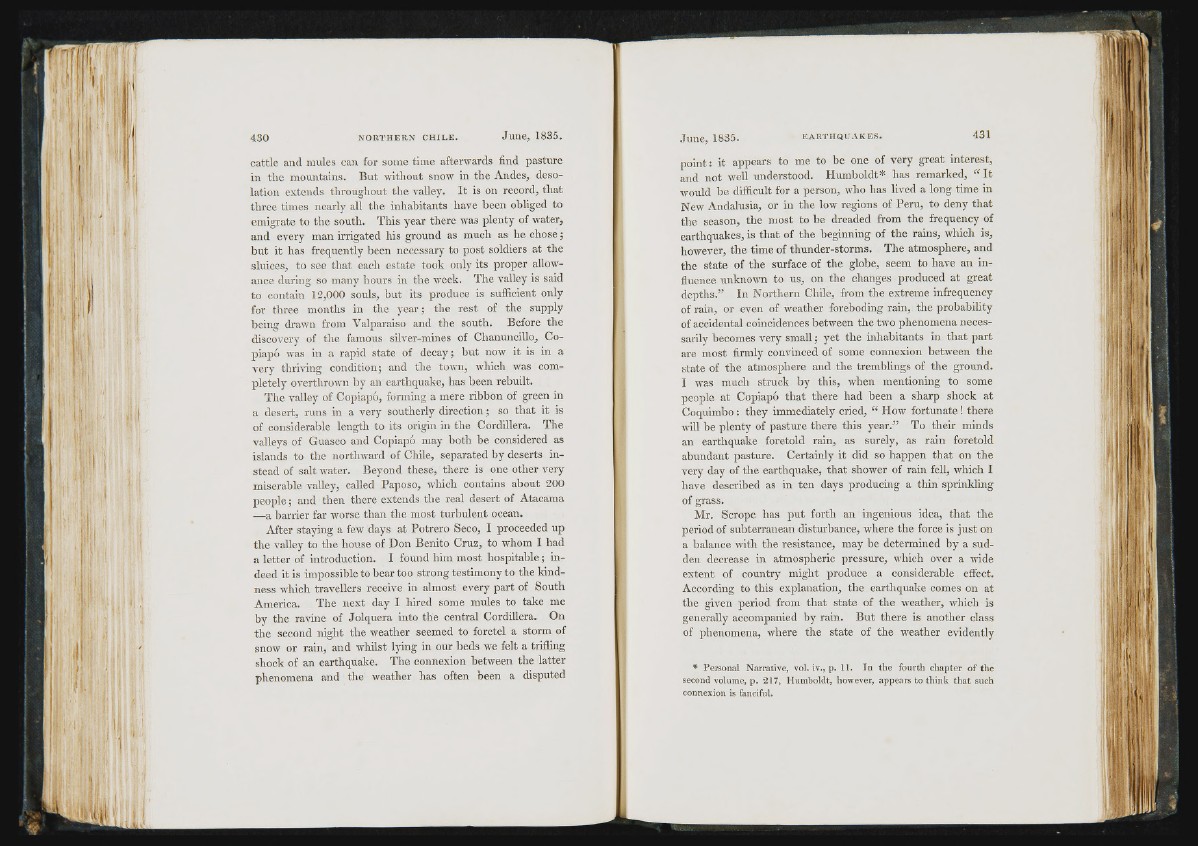
'T ■( t
: it
i i
cattle and mules can for some time afterwards find pasture
in the mountains. But without snow in the Andes, desolation
extends throughout the valley. It is on record, that
three times nearly all the inhabitants have been obliged to
emigrate to the south. This year there was plenty of water,
and every man irrigated his ground as much as he chose;
but it has frequently been necessary to post soldiers at the
sluices, to see that each estate took only its proper allowance
during- so many hours in the week. The valley is said
to contain 12,000 souls, but its produce is sufficient only
for three months in the year; the rest of the supply
being drawn from Valparaiso and tbe south. Before the
discoverv of the famous silver-mines of Chanuncillo, Copiapo
was in a rapid state of decay; but now it is in a
very thriving condition; and the town, which was completely
overthrown by an earthquake, has been rebuilt.
The valley of Copiapo, forming a mere ribbon of green in
a desert, runs in a very southerly direction; so that it is
of considerable length to its origin in the Cordillera. The
valleys of Guasco and Copiapo may both be considered as
islands to the northward of Chile, separated by deserts instead
of salt water. Beyond these, there is one other very
miserable valley, called Paposo, which contains about 200
people; and then there extends the real desert of Atacama
■—a barrier far worse than the most turbulent ocean.
After staying a few days at Potrero Seco, I proceeded up
the valley to the house of Don Benito Cruz, to whom I had
a letter of introduction. I found him most hospitable; indeed
it is impossible to bear too strong testimony to the kindness
which travellers receive in almost every part of South
America. The next day I hired some mules to take me
by the ravine of Jolquera into the central Cordillera. On
the second night the weather seemed to foretel a storm of
snow or rain, and whilst lying in our beds we felt a trifling
shock of an earthquake. The connexion between the latter
phenomena and the weather has often been a disputed
point: it appears to me to he one of very great interest,
and not well understood. Humboldt* has remarked, “ It
would be difficult for a person, who has lived a long time in
New Andalusia, or in the low regions of Peru, to deny that
the season, the most to be dreaded from the frequency of
earthquakes, is that of the beginning of the rains, which is,
however, the time of thunder-storms. The atmosphere, and
the state of the surface of the globe, seem to have an influence
unknown to us, on the changes produced at great
depths.” In Northern Chile, from the extreme infrequency
of rain, or even of weather foreboding rain, the probability
of accidental coincidences between the two phenomena necessarily
becomes very small ; yet the inhabitants in that part
are most firmly convinced of some connexion between the
state of tbe atmosphere and the tremblings of the ground.
I was much struck by this, when mentioning to some
people at Copiapó that there had been a sharp shock at
Coquimbo : they immediately cried, “ How fortunate ! there
will be plenty of pasture there this year.” To their minds
an earthquake foretold rain, as surely, as rain foretold
abundant pasture. Certainly it did so happen that on the
very day of the earthquake, that shower of rain fell, which I
have described as in ten days producing a thin sprinkling
of grass.
Mr. Scrope has put forth an ingenious idea, that the
period of subterranean disturbance, where the force is just on
a balance with the resistance, may he determined by a sudden
decrease in atmospheric pressure, which over a wide
extent of country might produce a considerable effect.
According to this explanation, the earthquake comes on at
the given period from that state of the weather, which is
generally accompanied by rain. But there is another class
of phenomena, where the state of the weather evidently
* P e r so n a l N a r r a tiv e , vo l. iv ., p . 11. I n th e f o u r th c h a p te r o f th e
s e co n d v o lum e , p . 2 1 7 , H um b o ld t, h ow ev e r, a p p e a r s to th in k th a t su ch
c o n n e x io n is fan c ifu l.